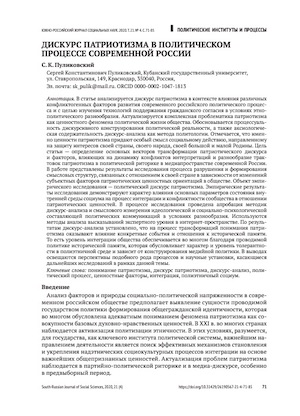Abstract
The article analyzes the discourse of patriotism in the context of influence of various conflict-provoking factors in the development of modern Russian political process, with the aim to study technologies for maintaining civil harmony in ethno-political diversity. A complex range of problems of patriotism as a value phenomenon in the political life of society is being actualized. The procedural nature of the discursive construction of political reality, as well as the axiological content of discourse analysis as a method of political science are substantiated. It is noted that it is the values of patriotism that give special meaning to social action aimed at protecting the interests of one’s country, one’s people and one’s large and small homeland. The aim of the article is to identify the main vectors of transformation of patriotic discourse and the factors that affect the diversity of interpretations of patriotism and the dynamics of conflicting interpretations in political rhetoric in the media space of modern Russia. The article presents the results of the research on the process of destruction and formation of semantic structures that are connected with the attitudes towards one’s country, depending on changes in the subjective factors of patriotic values in society. The object of empirical research is the political discourse of patriotism. The empirical results of the study show the way in which the basic parameters of the state of internal social environment influence the process of community integration and its internal conflicts with regard to patriotic values. In the course of the research, the methods of discourse analysis and of semantic measurement of the ideological and socio-psychological component of political communication in diversity were tested. Different methods were resorted to analyze expert-level statements on the Web. The discourse analysis has demonstrated that specific events in and attitudes to historical memory influence transformations in understanding patriotism. In other words, the level of social integration is ensured largely by the policy of historical memory, which determines the nature and level of tolerance in a multi-ethnic environment and depends on the design of media policy. The conclusions highlight the prospects for such processes and the scientific guidance for further research on the topic.
Keywords
References
Агафонов, А.Ю. (2007). Когнитивная психосемантика сознания или как сознание неосознанно принимает решение об осознании. Москва: Бахрах-М.
Альтерматт, У. (2000). Этнонационализм в Европе. Москва: Изд. центр РГГУ.
Беспалов, Д.Н., Казаков М.А. (2015). Патриотизм как критерий изменений переходного политического процесса: проблемы на пути к информационному обществу. Бизнес. Общество. Власть, 22, 15–27.
Ван Дейк, Тён А. (2014). Дискурс и власть: Репрезентация доминирования в языке и коммуникации. Москва: Книжный дом «ЛИБРОКОМ».
Волков, Д., Колесников А., Левинсон А. (2020). Альтернативы для России: каким видят будущее страны сторонники и противники перемен. Режим доступа https://carnegieendowment.org/files/Carnegie_Moscow_Article_Volkov_Kolesnikov_Russian_final1.pdf
Галицкая, К.А. (2021). Политика национальной памяти как технология легитимации власти. Научный журнал «Дискурс-Пи», 1(42), 48–61. DOI: 10.24412/1817–9568–2021–1–48–61
Геллнер, Э. (1991). Нации и национализм. Москва: Прогресс.
Глезеров С. (2020). Как правильно родину любить? Эксперт — о патриотизме в России. Санкт-Петербургские ведомости, 2020, 16 сентября. Режим доступа https://eusp.org/news/kak-pravilno-rodinu-lyubit-istorik-mikhail-krom-rasskazal-o-patriotizme-v-rossii-i-ego-proyavleniyakh
Гудков, Г. (2021). Способна ли Россия стать свободной? Режим доступа https://echo.msk.ru/blog/gudkov/
Журавлев, В.А. (2013). Патриотизм и национализм как факторы российской истории. Вестник российского гуманитарного научного фонда, 3(72), 16–40.
Зеленский, В.В. (1996). Послесловие к книге: В. Одайник. В Психология политики. Психологические и социальные идеи Карла Густава Юнга (с. 368–380). СПб.: Ювента.
Капустин, Б.Г. (2010). Критика политической философии: Избранные эссе. М.: Издательский дом «Территория будущего».
Костяев, А.И. (2013). Социокультурные аспекты исследования российского патриотизма. М.: ЛЕНАНД.
Магарил, С.А. (2016). Смыслы патриотизма — исторические трансформации. Режим доступа https://newconcepts.club/uploads/magarill2016.pdf
Малинова, О.Ю. (2009). Россия и «Запад» в ХХ веке: трансформация дискурса о коллективной идентичности. Москва: РОССПЭН.
Мартынов, М.Ю., Фадеева Л.А., Габеркорн А.И. (2020). Патриотизм как политический дискурс в современной России. Полис. Политические исследования, 2, 109–121. DOI: 10.17976/jpps/2020.02.08
Матишов, Г.Г. Авксентьев В.А. (ред.) (2008). Региональные конфликты и проблемы безопасности Северного Кавказа. Ростов-на-Дону: Изд-во ЮНЦ РАН.
Мирошниченко, И.В. (2020). Сетевые сообщества в публичном пространстве политики: субъектные характеристики и ресурсы управляемости. В Политическое представительство и публичная власть: трансформационные вызовы и перспективы. Материалы Ежегодной всероссийской научной конференции с международным участием РАПН’2020, Москва, МПГУ, 27–28 ноября 2020 г. (с. 339–340). Москва: Изд. МПГУ.
Проханов, А. (2021). Особое мнение. Эхо Москвы (02.03.2021) Режим доступа https://echo.msk.ru/programs/personalno/2798262‑echo/
Селезнева, А.В. (2017). Патриотизм как политическая ценность: политико-психологический анализ. Вестник Томского государственного университета: Философия. Социология. Политология, 38, 200–208.
Семененко, И.С. (ред.) (2017). Регулирование этнополитической конфликтности и поддержание гражданского согласия в условиях культурного разнообразия: модели, подходы, практики. Аналитический доклад. М.: ИМЭМО РАН.
Сиркия, Н.П. (2018). Политический дискурс vs политический интернет-дискурс: сходства и различия (когнитивный аспект). Историческая и социально-образовательная мысль, 10(2/2), 164–170.
Смит, Э. (2004). Национализм и модернизм: Критический обзор современных теорий наций и национализма. Москва: Праксис.
Соловьев, А.И. (ред.) (2007). Политология: Лексикон. Москва: РОССПЭН.
Темнова, Е.В. (2004). Современные подходы к изучению дискурса. В Язык. Знание. Коммуникация (с. 24–32). Москва: ООО «МАКС Пресс».
Тишков, В.А. Шнирельман В.А. (ред.) (2007). Национализм в мировой истории. Москва: Наука.
Трифонов, Ю.Н. (2017). Смыслы и парадоксы патриотического дискурса в современной России: политико-философский ракурс. Известия Саратовского университета. Серия «Социология. Политология», 17(1), 86–91.
Фан, И.Б. (2013). Дискурс патриотизма: от многообразия к монополии. Дискурс-Пи, 10(1–2), 147–153.
Франкл, В. (1990). Человек в поисках смысла: Cборник. Москва: Прогресс.
Шейгал, Е.И. (2000). Семиотика политического дискурса. Волгоград: Перемена.
Як, Б. (2017). Национализм и моральная психология общества. М.: Изд-во Института Гайдара.
Schudson, M. (1997). Sending a Political Message: Lessons from the American 1790s. Media, Culture and Society, 3, 311–330.
Van Dijk, Teun А. (1999). Discourse and Rasism. The Blackwell Companion to Racial and Ethnic Studies. Oxford: Blackwell.
Van Dijk, Teun А. (2002). Political discourse and ideology. Anàlisi del Discurs Polític. Producció, mediació i recepció, 207–225. DOI: 10.31921/doxacom.n1a1210.31921/doxacom.n1a12
Wodak, R., Seldak M. (2000). ‘We Demand that Foreigners Adapt to our Life-Style’: Political Discourse on Immigration Laws in Austria and the United Kingdom. Combating Racial Descrimination. Oxford: Blackwell


